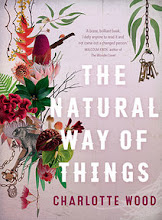life and death matters
By Wendy Cavenett
The year is 2001...
The father tucks his children into bed for the night, slips downstairs and answers the phone. It’s just after 10pm on a cold London evening and Will Self, a modern day enfant terrible, sounds quietly philosophical. He’s on the wagon again after nearly 20 years of drug and alcohol addiction—a devastating illness, he says, that nearly destroyed his life.
A fan of the Victorian novelists, and a writer who favors character over plot, Self is a complex of encyclopedic knowledge, effusive wit and candid fervor. In his new book, How The Dead Live, Self takes the reader on an intriguing—and at times, perverse—ride where life and the after-death experience is based on the ancient Tibetan teachings of the Bardos. Narrated by the scoop-breasted Lily Bloom and imbued with all manner of Selfian acuity, this is the novel many have been waiting for, the one that some critics believe announces Self’s ‘arrival as a novelist’.
Here’s Self on Self:
“I was actually sober at the time my mother died and I nursed her during the last months of her life. It was extremely upsetting and painful, but at the same time a tremendous relief to me, her passing, because she’d been quite a difficult character and we’d been rather enmeshed with each other in life. For anybody who’s lost a parent who one’s very close to, it’s such a big event in your life that you can’t quite tell where it stops and where you begin. It’s a wholly disorienting experience in that way. For years after a bereavement like that you’re still asking yourself whether you’ve even apprehended it—you know, whether you really know what’s happened and I think that’s why I’ve actually ended up writing quite a lot about it.
“Just after my mother died, I had that very common experience of thinking I saw her in the street and not really being able to believe that she was dead. After about five years you really know somebody is dead and then, between about five and 10 years after their death, there’s a strange and indefinable point where somebody becomes anachronistic. Even if they were resurrected they’re look out of place, sort of standing next to a new model car they’d look like somebody cut out of an Edwardian photograph. And that’s kind of the point at which somebody becomes ‘deader’. That’s why I use those three heads—dying, dead and deader—for the three factions of How The Dead Live. And that’s why I had this idea of what a marvellously acerbic and direct critic of contemporary mores a dead person would make. You know, how, if somebody feels that they’re alienated from the Zeitgeist when they’re alive, how much more angry are they going to feel about it once they’re dead? So that was a lot of the inspiration for the novel.
“And it’s exactly what it seems to be which I think, of course, some critics and readers have found very hard to take on board because they don’t expect to hear it from me—but the book is really a Buddhist allegory. It’s a mystical allegory. The main character, Lily Bloom, follows in death the stage of the Bardos as described in the Tibetan Book Of The Dead. Her psyche disintegrates and she is represented by these passion plays of the negative elements of her own psyche before being reborn in due course.
“People have always said my work is very dark and morbid and nihilistic, but what I hope it has been is just properly adumbrated, you know, that death shades all of life… Life is life and death. You cannot divorce death from life in the moment let alone in the life-span. One shouldn’t think, say, come 40 I’ll think about dying. Even Freud recognised this for heaven’s sake and saw the death drive as implicit in almost every breath we take. That every conscious thought was willed against the drag of extinction.
“There’s a newspaper column in the Mail On Sunday where they come and interview you about how you would like to die. I was very interested to learn from the woman who came to interview me for this that something like 90 per cent of the people she’d interviewed said that they wanted to die in their sleep. You couldn’t have a clearer exemplification of the attitude of our culture towards death than that—that everybody wants to die, as it were, unknowingly. I’m not saying ‘come and take me now’. But I think that it is a noble wish to die honourably in the full face and full flower of one’s consciousness and to meet death on those terms.”
> > >
> > >



No comments:
Post a Comment